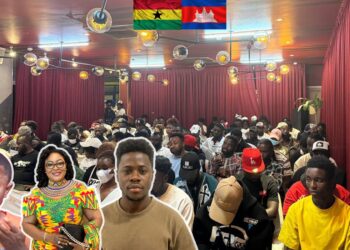DannyRich, a Ghanaian based in Canada, shared his perspective on life abroad during an interview on SVTV Africa’s Daily Hustle Worldwide with DJ Nyaami.
According to DannyRich, anyone who has lived in Canada long enough knows which areas to avoid due to safety concerns.
“Most of the chaos happens in group settings,” he said, “Some people waste opportunities, and gangs have taken over—killing even children. When they strike, they call several people and target high-ranking members. In one instance, five people were killed.”
He pointed out that certain provinces with dense immigrant populations have become hotspots for crime.
“Many young men are under the influence of hard drugs, and the levels of crime range from first-degree to fifth-degree murder.”
DannyRich also spoke on racial double standards:
“White people preach human rights but practice something else. In reality, some whites might kill blacks, but you rarely see blacks killing whites. Yet, society expects black people to be saints. Arabs may act friendly, but deep down, they don’t like us either.”
On migration, he questioned the popular notion of moving abroad for the sake of children’s future.
“People leave good opportunities in Ghana thinking abroad is better. But I don’t believe moving abroad always guarantees a better future for your kids. I decided to educate my children myself. If your child wants to succeed, it’s about the foundation you lay—not the country.”
He gave an example:
“Ghana’s ambassador to Korea was born in Ghana, educated there, and later returned to serve. If you build a strong life, your children will likely follow your example. Give them proper education and a clear path, and they’ll do even better than you.”
He argued that if a parent can afford top schools like GIS or DPS in Ghana, there’s no need to send a child abroad.
“Abroad, they’ll be exposed to ideologies like LGBT and other things that may conflict with your values. I brought my child abroad, but I’m mindful of what they are taught.”
DannyRich also reflected on misplaced priorities among Africans abroad. “Some people think happiness is eating chicken and pounded fufu for $5, but food isn’t everything. Aim to eat healthily and pursue greatness. Don’t get too comfortable—remember, you’re on someone else’s land.”
He emphasized the psychological toll of life abroad. “Poverty has distorted our thinking. If you don’t know your worth, you lose your humanity. White people may mingle with us in Africa, but back in their country, they’ll call the police if you say hi.”
He added, “Even Chinese people can be rude in their own country but act humble in Ghana because they know they’re not home. I’ve seen a Ghanaian worker here managing a shop—it shows potential. Many Ghanaians abroad sleep in cramped spaces but build mansions back home.”
In contrast to Ghana’s communal lifestyle, he noted the loneliness abroad. “In Ghana, we greet each other daily. Here, people hardly interact, and that leads to depression and mental health struggles, especially for women.”
He concluded with a caution: “Don’t seek opinions from just anyone. If someone was brought abroad by a parent and doesn’t even know how to apply for a visa, they can’t advise you properly.”

















